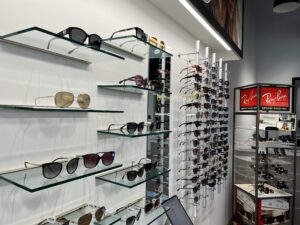How Can the Sun Hurt My Eyes? How Do I Pick Out Safe Sunglasses?
When it comes to sunscreen, we have all heard that we can get sunburned if there is a lot of visible sun but we can also get harmed by the sun’s rays even if it is overcast. The same rings true with protecting our eyes.
Most people shop for sunglasses due to necessity, but many do for fashion and the majority of us make sure the frames fit our faces. It is rare to hear people actually question the protection behind the lenses, so we want to outline it in a very ‘readable’ fashion for our readers and patients.
 First and foremost, HOW can the sun hurt your eyes?
First and foremost, HOW can the sun hurt your eyes?
UV rays can damage your eyes both in long and short term ways. Exposure to the sun’s UV rays:
- can exacerbate macular degeneration in your eyes,
- can also damage your eyes and vision
- can cause cataracts
- can cause premature aging
- can cause eyelid cancers
Everyone has heard of UVA and UVB rays – according to the Skin Cancer Foundation
- Ultraviolet A (UVA) has a longer wavelength. It is associated with skin aging.
- Ultraviolet B (UVB) has a shorter wavelength. It is associated with skin burning.
When you are shopping for sunglasses, you should look for sunglasses labeled 100 percent UVA/UVB protection or 100 percent UV 400. This essentially means the same thing.
If a tinted lens has UV400 protection, it means that it blocks almost 100% of harmful UV light
Do polycarbonate lenses need UV coating? According to this article: polycarbonate blocks almost the entire relevant UV spectrum, including both UVA and UVB. The material absorbs UV radiation and does not allow it to be transmitted through. Polycarbonate lenses do not need UV coatings.
Do transition lenses have UV protection? According to EyeBuyDirect, transition lenses have UVA and UVB protection. Since they automatically switch between UV protection and vision correction modes, you’ll never need to put your sunglasses on again.
In conclusion, UV protection is something that is very easy to find, fashionable, and worth looking into! Besides the newest variety of luxury sunglasses, our optical at Vision Source Shadow Creek has an enormous variety of UV400 lenses, polycarbonate and transition lenses. Come in Monday-Saturday to look around and talk to any of our opticians about the right choices for you!